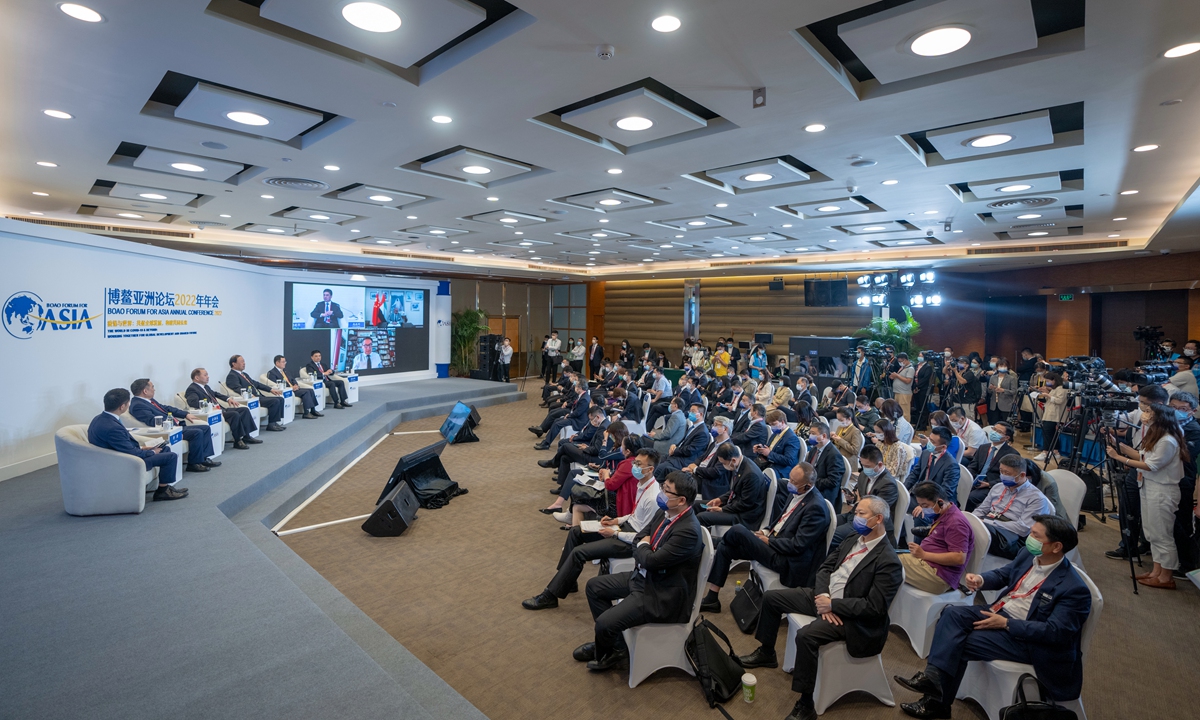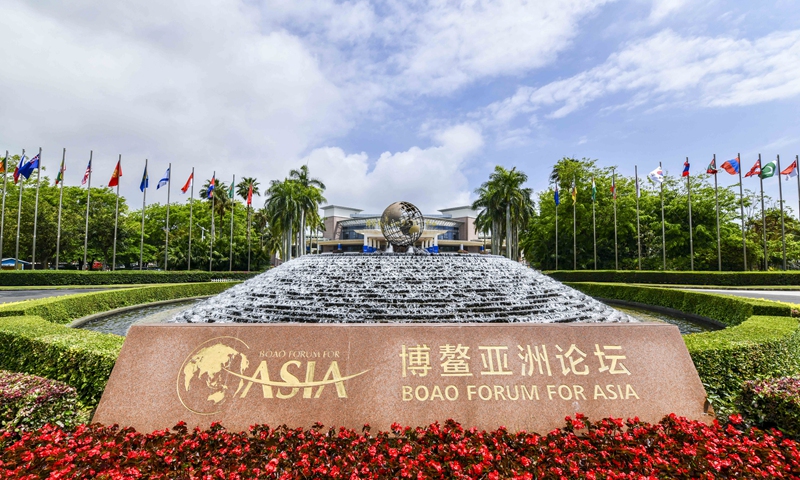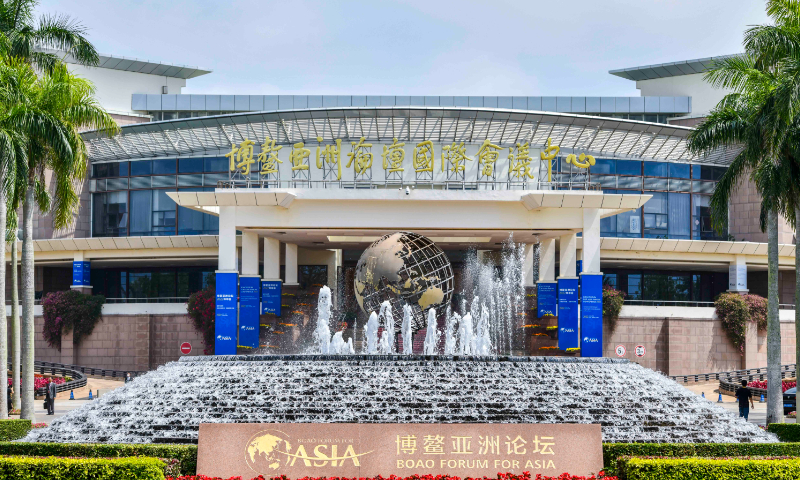 Photo shows the fountain square in front of the permanent site of the Boao Forum for Asia (BFA) in Boao, South China's Hainan Province, on April 19, 2022. Photo: cnsphoto From the Global Development Initiative to the Global Security Initiative, China has always been a firm practitioner of true multilateralism. History will continue to prove that such a choice is on the right side of the history and on the side of human progress.
Photo shows the fountain square in front of the permanent site of the Boao Forum for Asia (BFA) in Boao, South China's Hainan Province, on April 19, 2022. Photo: cnsphoto From the Global Development Initiative to the Global Security Initiative, China has always been a firm practitioner of true multilateralism. History will continue to prove that such a choice is on the right side of the history and on the side of human progress.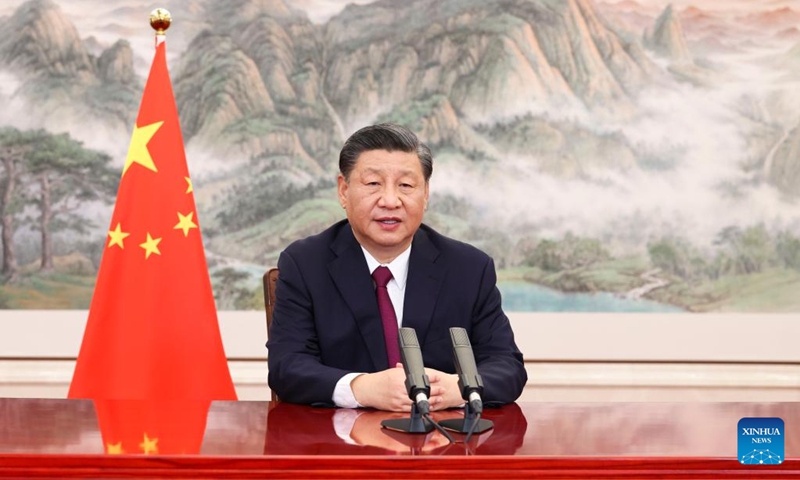 Chinese President Xi Jinping delivers a keynote speech via video at the opening ceremony of the Boao Forum for Asia Annual Conference 2022, on April 21, 2022.(Photo: Xinhua)
Chinese President Xi Jinping delivers a keynote speech via video at the opening ceremony of the Boao Forum for Asia Annual Conference 2022, on April 21, 2022.(Photo: Xinhua)The Boao Forum for Asia Annual Conference 2022 is being held in Boao, Hainan Province, from April 20 to April 22. The theme of this year's forum is "The World in COVID-19 and Beyond: Working Together for Global Development and A Shared Future." In a keynote speech delivered at the opening ceremony of the forum on Thursday, Chinese President Xi Jinping proposed a Global Security Initiative, emphasizing the need to uphold "true multilateralism" and that it is particularly important for major countries to lead by example in honoring equality, cooperation, good faith and the rule of law, and act in a way befitting their status.
At present, the changes in the world, the times, and history are unfolding in an unprecedented way. At a time when unprecedented global changes are combined with a once-in-a-century pandemic, the world is at the crossroads of unity or division, cooperation or confrontation, upholding justice or hegemony. Xi's emphasis on "true multilateralism" is of great significance for lighting the way forward for international society to move on and promote peaceful development.
What is true multilateralism? It is, after all, that international affairs should be handled by all through consultations and the future and destiny of the world will be jointly decided by all countries. Such "true multilateralism" cannot be separated from the United Nations, therefore we must firmly safeguard the international system with the UN at its core; it cannot be separated from the international law, so we must unwaveringly uphold the international order underpinned by international law; it cannot be separated from global cooperation, so major powers need to lead by example in upholding justice, enforcing the rule of law, taking responsibility, and focusing on actions.
When representatives from 42 countries and regions were discussing regional solidarity and cooperation at the Boao forum, Washington was hosting the G20 Finance Ministers and the Central Bank Governors meeting. Finance ministers of countries including the US and Canada walked out when the Russian delegate spoke, staging a show of "political protest"at an international multilateral economic cooperation forum. The US supports a draft resolution to adjust the use of the veto by permanent members of the UN Security Council. All those acts are weakening and jeopardizing multilateralism and multilateral mechanisms.
In stark contrast, Asia is "climbing the hill together and going down the ravine together" and making "sugarcane and lemongrass grow in dense clumps." In 2021, the region withstood the pressure of the raging COVID-19 pandemic and led the global economic recovery. Measured by purchasing power parity, Asia accounted for 47.4 percent of the world's economy in 2021. From taking the lead in advocating the Five Principles of Peaceful Coexistence and the Bandung Spirit, to jointly promoting the signing of the Regional Comprehensive Economic Partnership Agreement, Asian countries have made maintaining and practicing multilateralism in the region to transform from an experiment to a model, through all-round and broad-based win-win cooperation.
However, for Washington accustomed to creating rivals and stirring up trouble around the world to gain benefits, the stability and prosperity of Asia have become a thorn in its flesh. To seize the moral high ground and sugarcoat its geopolitical ambitions, Washington has even packaged its so-called Indo-Pacific Strategy as "multilateralism." It also has attempted to disturb regional peaceful development by strengthening its "multilateral mechanisms," including its "quadrilateral mechanism" and "trilateral security partnership." If we want to practice "true multilateralism," we must be wary of and oppose such "fake multilateralism."
It is clear that a lot of unrest, division, and poverty have been created in different parts of the world under practices of prioritizing one country's interests, making coteries that uphold hegemony, treating international rules as a tool for the interests of one nation, using a certain country's interests as the criteria, and engaging in "selective multilateralism." The US is still using the Russia-Ukraine conflict to further divide the world into camps and keeps pressuring neutral countries to "take sides." Such a "fake multilateralism" sometimes is deceptive to some extent, but more and more countries have seen through it and denied any attempts to stir up troubles globally or seize geopolitical "fruits."
As a Chinese saying goes, "Power may win for the time being, but justice will prevail for the long run." All countries across the world are in the same boat with a shared destiny. We must work together to sail through the stormy seas to a bright future. Any attempt to throw whoever into the sea is unacceptable. From the Global Development Initiative to the Global Security Initiative, China has always been a firm practitioner of true multilateralism. History will continue to prove that such a choice is on the right side of the history and on the side of human progress.
Xi proposes Global Security Initiative at Boao Forum, 'sends signal of peace, stability amid global turmoil’...
Solidarity stressed amid global changes, injects confidence in economic recovery
Chinese President Xi Jinping proposed a global security initiative which stressed a commitment to the vision of common, comprehensive, cooperative ...
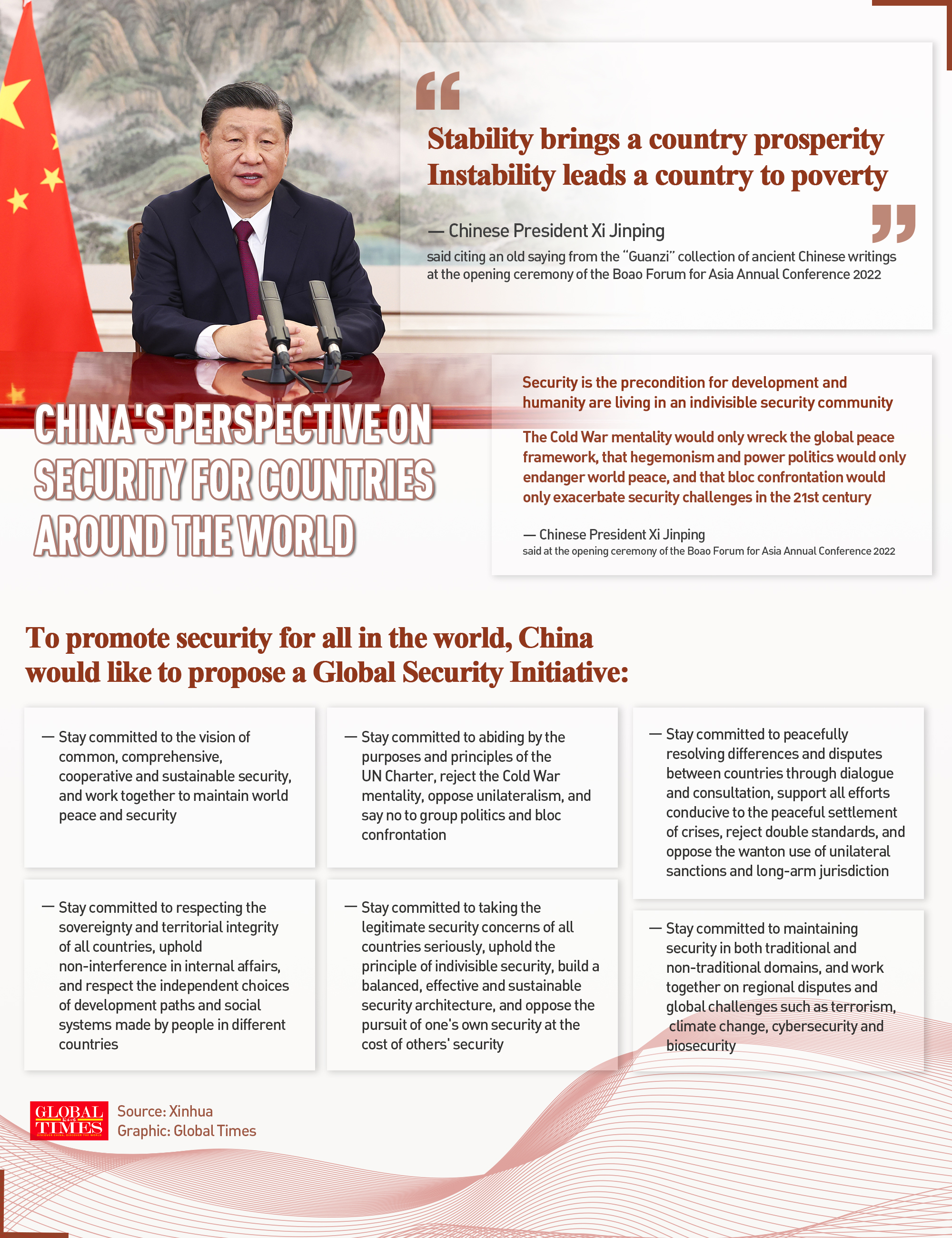
Chinese President Xi Jinping delivered a keynote speech via video link at the opening ceremony of the Boao Forum for Asia Annual Conference 2022 held in Boao, Hainan Province. Here are some highlights of his remarks (4/12)
China's multilateralism pledge at Boao Forum helps safeguard world security amid pandemic, conflict
China's commitment to multilateralism and opening-up is reassuring to a world faced with rising security risks, academics and delegates attending the Boao Forum for Asia (BFA) 2022 said on Wednesday, as the international forum amid a new round of epidemic ...
Multilateralism, regional integration will ease supply chain problems: Boao Forum
The ongoing global supply chain crisis should be tackled by the major economies leading by example through multilateral consultation, economists and delegates attending the Boao Forum for Asia 2022 said.
Boao Forum is a Chinese message about world collaboration in the post-pandemic era: envoy
Despite global challenges, the Boao Forum for Asia held in South China's Hainan Province, sent the world an important message of global collaboration and development while addressing new opportunities in Asian regional cooperation to overcome economic hurdles in the post-pandemic era, the Mongolian Ambassador to China said on Thursday.
Related posr:
BOAO Forum 2016: Asia's New Future - New Dynamics, New Vision


